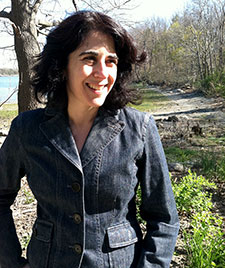
Linda Schlossberg writes fiction and teaches literature and creative writing at Harvard.
By JT Thompson
Linda Schlossberg grew up in San Francisco, initially in the Haight Ashbury district, then in the suburbs, and came to Boston as an undergraduate at Brandeis. She then earned a PhD at Harvard in English and American literature, and is now Assistant Director of Studies for Harvard’s Women, Gender and Sexuality Studies Program. She was thrilled to be awarded a 2019 Literary Arts Fellowship from the Somerville Arts Council/Mass Cultural Council, as well as the 2016 Emerging Writer Fellowship from the Writer’s Center in Maryland.
The courses she teaches focus on gender, literature, and creative writing. She speaks with a dynamic mixture of quiet thoughtfulness and lively enthusiasm, pausing to reflect before answering a question, and then lighting up when she answers.
Schlossberg lives just outside Union Square. “It feels like a small town in my neighborhood, I love the sense of community, which is so important. I’m actually working now on a book set in Somerville in the 18th century.”
When did you first start to consider yourself a writer, and how would you describe the difference between your academic writing and your creative writing?
“I had taken a creative writing class my senior year in college, but then I started a PhD the next year and put it aside for a while. They’re very different kinds of writing. For the most part, academic writing is argumentative, evidence based. Eventually I started writing fiction again.”
Schlossberg’s first published novel, Life in Miniature, came out in 2010. She is currently completing a second novel, a feminist dystopia, while also working on her book set in Somerville.
“Part of the creative process I find so enjoyable is that you often don’t know why you wrote something. There’s a surprise about what ends up on the page. That can happen with scholarly work too, but in creative writing there’s more opportunity for the writing to tell you what it wants to do.
“At the same time, what I appreciate about teaching creative writing is that I’m able to ask the author directly why they used a particular turn of phrase, what they’re trying to communicate, which has a whole richness of its own.
“And the material is new every week. When I’m teaching literature, I’ve done it before, I have my shtick about it, I know its history, its critical reception. With my students’ writing, it’s all fresh.”
What was your experience of the Women’s March?
“I was in Boston, and it felt to me like we were witnessing this expression of collective rage. It was exciting to be around so many people speaking out. What was so moving was seeing the coverage of people marching all over the world, showing solidarity, showing that they know they would be affected by Trump’s presidency as well.
“It felt really good to know we weren’t alone. Which felt especially important because the country is so split.”
What’s your perspective on the #metoo movement?
“It feels long overdue. It’s been incredible to see all these people sharing their stories. And there’s been a collective outpouring of support.
“It seems crazy that it took the experiences of people in Hollywood to get media coverage on issues activists have been working on for years.
“The timing is really telling, it came in a perfect storm with the outrage about Trump.
“As a person who’s been teaching these issues for a long time, it’s exciting to see them become part of mainstream conversation.”
What do you think a more woman led America would be like?
“That’s the toughest of the questions you’ve asked.” Schlossberg pauses. “We don’t really know. The future of whatever feminism will be is being built by young people, and I think it will be more inclusive, of people of all genders.”
What would you like to say to women in America today?
“Advocate for yourself. But also advocate for others. Use whatever power you have to advocate for social change and progress.
“And there are many different kinds of power – educational, political, organizing, being an activist, being creative.
“We all have some way to contribute.”















Reader Comments